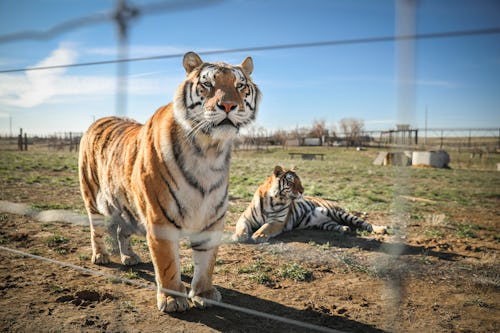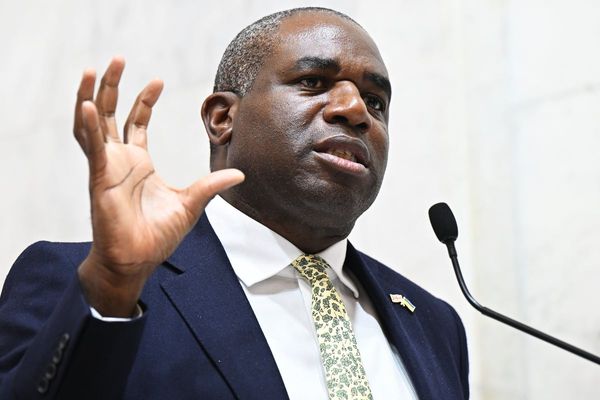
Considering that we're living in a fast paced, chaotic world again —where phrases like "during lockdown" and "when we were in quarantine" are whispered, unmasked over post vax cocktails — it can be hard to remember those bleak months of 2020 during which life as we knew it came to a halt. Perhaps it's a willful cultural amnesia to move on from the trauma of it all (though we are still most certainly in a pandemic). Maybe we don't want to remember being "bored in the house." But Netflix bopped in to remind us today that during that time they created a mass cultural hysteria with their show Tiger King — which the country essentially watched together in one giant, government sanctioned viewing party — and as if our file of "things we don't need" could get any bigger, they announced they're releasing a second season.
Tiger King dramatized the world of Florida big cat breeders in a soap-opera fashion, and launched wild characters like Joe Exotic (Joseph Maldonado-Passage) and Carole Baskin to fame. The show also managed to catch the beginning of Maldonado-Passage's arrest for conspiring to murder Baskin, among other salacious and bizarre plot points. And while the show's absurdist quality made it compulsively watchable, especially when we were trying to numb our way through such a horrific moment in history, it highlighted a growing moral ambiguity in the true crime meets reality TV genre.
It was reported that co-producers and co-directors, Eric Goode and Rebecca Chaiklin, had vocally set out to make the big cat version of 2013's hit documentary Blackfish that caused major backlash against SeaWorld. But as Blackfish producer Manny Oteyza simply put it, "Tiger King is not the Blackfish of the big cat world." While Tiger King might have succeeded at being entertaining, it completely failed one of its main subjects, the big cats in captivity all around this county at breeding farms disguised as "sanctuaries" and roadside zoos. With the lack of government regulation on big cat ownership, there are now more big cats in captivity in these amusement-type establishments in the US alone than in the wild — a fact the show fails to mention. And much like a carnival barker, the show seemed to yell "don't mind the rampant animal abuse we're showing you!" and instead pulled focus to its set of whacky, morally reprehensible characters.
In many ways that carnival barking worked. One huge problem with Tiger King was the gross hero worship of Joe Exotic that it spurred, a felon who all but directly admits to killing big cats when they become too unruly to manage, while also exploiting and derailing the lives of those around him on camera. While he seemed like something out of a Danny McBride creation, he wasn't fictional, and the show overlooked his dubious and amoral behavior for the sake of reveling in wild, unseen Americana of it all. The fanaticism for Exotic got to the point that then President Trump was even asked during a press conference at the time if he would consider pardoning Maldonado-Passage. Carole Baskin, the villain of the show despite being one of the few characters running a recognized conservatory for Big Cats, who also straddled moral lines in the story, ended up on Dancing With The Stars after Tiger King reached peak frenzy — performing at one point in a lion costume.
Tiger King also pointed out another growing trap of our ever streaming, perpetually online world, and that is the lengths people will take to farm content at this point. While sometimes it feels like the true crime bubble has burst, it doesn't seem to be going away, only morphing. Streamers and podcasters are having to shift and find new ways to tell us horrifying, fucked up things that really happened, but they're managing. And then we as the consumers gleefully gobble them up. It's not necessarily wrong, but it is strange, and the fanaticism over Joe Exotic points to how it can have a sinister side.
Our escapism has become watching things fall apart, and that has consequences. Tim Harrison, a retired police officer and exotic wildlife specialist in Dayton, Ohio, spoke to the negative impact he expected Tiger King to have on the plight of big cats, stating "We’re going to start seeing more selfies with cubs, more people wanting tiger cubs." He told the New York Times that he had also refused to participate in the first season because, "it sounded like potentially it could be a freak show.” And Mr. Harrison was completely correct. While Netflix might have curated a hit by releasing the first season of Tiger King at the beginning of a dark time, it's clear that they have no concern for its ramifications. As the pandemic continues to ravage the world, despite it unfortunately being normalized at this point, the streaming service — whose advert for season two promises "just as much mayhem and madness" — seems to answer that existential reality with, "Let them eat cake," or rather "Let them watch more Tiger King."







